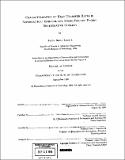| dc.contributor.advisor | Alan H. Epstein and Jack L. Kerrebrock. | en_US |
| dc.contributor.author | Lopata, Jacob Brian, 1968- | en_US |
| dc.date.accessioned | 2005-08-19T18:50:39Z | |
| dc.date.available | 2005-08-19T18:50:39Z | |
| dc.date.copyright | 1998 | en_US |
| dc.date.issued | 1998 | en_US |
| dc.identifier.uri | http://hdl.handle.net/1721.1/9601 | |
| dc.description | Thesis (S.M.)--Massachusetts Institute of Technology, Dept. of Aeronautics and Astronautics, 1998. | en_US |
| dc.description | Includes bibliographical references (p. 105). | en_US |
| dc.description.abstract | An experimental investigation that characterizes heat transfer rates to supercritical ethanol in micro-channels is presented. Forced convection heat transfer data resulted from the use of small diameter circular tubes fed by a pressurized fuel supply. The test sections consisted of resistively heated stainless steel hypodennic tubes ~4mm in length with an inside diameter of ~95[mu] Test conditions were such that most of the physical parameters that are expected in the cooling passages of a silicon fabricated MicroRocket engine were duplicated. These included conditions of temperature, pressure, film Reynolds number, bulk Nusselt number, and heat flux. The pressures investigated were 100atm and 300atm, corresponding to reduced pressures of 1.62 and 4.86 respectively. Heat flux values ranged from 3 to 125Wlmm2. Experimental results indicate that ethanol is a suitable fuel for a regeneratively cooled MicroRocket engine. At several observed pressures, temperatures and heat fluxes, bulk Nusselt number values exceeded those required in the engine cooling passages. In addition, an analysis of the inside tube wall of one of the test sections indicates that carbon deposition resulting from the pyrolysis of ethanol will not be an issue for MicroRocket engine design. It was also found that established empirical formulas provided poor correlation to experimental data but that one of these equations suitably modified, provided excellent correlation at 300atm for a restricted range of conditions. | en_US |
| dc.description.statementofresponsibility | by Jacob Michael Lopata. | en_US |
| dc.format.extent | 105 p. | en_US |
| dc.format.extent | 6147066 bytes | |
| dc.format.extent | 6146826 bytes | |
| dc.format.mimetype | application/pdf | |
| dc.format.mimetype | application/pdf | |
| dc.language.iso | eng | en_US |
| dc.publisher | Massachusetts Institute of Technology | en_US |
| dc.rights | M.I.T. theses are protected by copyright. They may be viewed from this source for any purpose, but reproduction or distribution in any format is prohibited without written permission. See provided URL for inquiries about permission. | en_US |
| dc.rights.uri | http://dspace.mit.edu/handle/1721.1/7582 | |
| dc.subject | Aeronautics and Astronautics | en_US |
| dc.title | Characterization of heat transfer rates in supercritical ethanol for micro-rocket engine regenerative cooling | en_US |
| dc.title.alternative | Characterization of heat transfer rates in supercritical fuel for micro-rocket engine regenerative cooling | en_US |
| dc.type | Thesis | en_US |
| dc.description.degree | S.M. | en_US |
| dc.contributor.department | Massachusetts Institute of Technology. Department of Aeronautics and Astronautics | en_US |
| dc.identifier.oclc | 42218111 | en_US |
